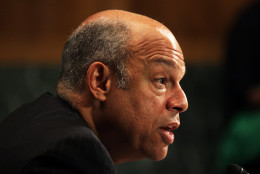Contracting
-
DoD is asking stakeholders for their input on a rule that would raise the barrier for independent research and development funds.
February 15, 2016 -
Rich Lombardi, the service’s principal deputy assistant secretary for acquisition, has been reassigned after he did not properly disclose a financial interest in a defense firm.
February 12, 2016 -
Stan Soloway, former president of the Professional Services Council, joins host Mark Amtower to discuss the state of professional services contracting, the Defense Authorization bill, the 1102 workforce and more. February 15, 2016
February 11, 2016 -
Homeland Security Department Secretary Jeh Johnson said the department will ask Congress this year for permission to authorize the Joint Requirements Council and other task forces, to ensure that its "Unity of Effort" work carries on to the next administration.
February 11, 2016 -
A new survey from NAPA and ICF found agencies say budget and workforce challenges stand in their way to moving more toward digital services. The administration is trying to address both of those through the 2017 budget request and new training.
February 11, 2016 -
You've heard the saying. Don't take the law into your own hands. You take 'em to court. There's a corollary saying, or there should be. If you take 'em to court, hire a good lawyer. That is, don't try and represent yourself. Everyone's a genius, but three recent cases show the folly of trying to be your own lawyer. Procurement attorney Joseph Petrillo of Petrillo and Powell shares the details on Federal Drive with Tom Temin.
February 11, 2016 -
It's winter. That means in Washington, anything might happen, including the shuttering of federal office buildings. If you're a contractor, that doesn't mean the work stops. What should you do? Here's something not to do, and that's try and get advice from just anyone you can reach. Larry Allen, principal of Allen Federal Business Partners, talks about this an other matter in his blog this week. He also discussed the topic on Federal Drive with Tom Temin.
February 11, 2016 -
Reverse auctions could do more than get the federal government the best price. It turns out they can also bring independent software developers who have never contracted with the government before.
February 11, 2016 -
Richard D. Lieberman, a consultant and retired attorney, advises industry to be sure the right person is modifying or changing a contract before moving forward with the request.
February 10, 2016 -
Banged-up cars and seizing ship engines. A slice of federal programs isn't going as planned.
February 08, 2016 -
When U.S. Transportation Command transitioned a nearly $1 billion contract to move servicemembers’ vehicles around the world to a new company a year and a half ago, seemingly everything that could have gone wrong actually went wrong.
February 08, 2016 -
One of the Army’s key objectives is to bring reliable network access to smaller units at the company level and below. But DoD’s Office of Operational Test and Evaluation found the task has been complicated by the fact that too many of the systems the service is fielding are not exactly plug-and-play.
February 08, 2016 -
The latest reshuffling of the organizational chart is born out the current concerns among members of Congress that once DoD creates new bureaucracies they can never be shut down.
February 08, 2016 -
There's failure and then there's failure. Big and small. One way to prevent the big ones is to develop tolerance for the small ones along the way. That's in part the idea behind a Pentagon drive to get more commercial innovation into its so-called third offset strategy. For what this means to contractors, Larry Allen, principal at Allen Federal Business Partners spoke to Federal Drive with Tom Temin about the topic.
February 05, 2016 -
For many agencies, the move to cloud computing services is predicated by policy, legal and contracting decisions made by more than just the chief information officer.
February 05, 2016











